| Srl | Item |
| 1 |
ID:
141132
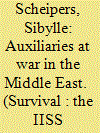

|
|
|
|
|
| Summary/Abstract |
In a BBC Radio Four interview on 9 October 2014, UK Defence Secretary Michael Fallon declared that the war against the Islamic State of Iraq and al-Sham (ISIS) in the Middle East ‘can only be won on the ground, but it can also only be won by a home army, not by America or Britain’. According to Fallon, this was the main lesson to be learned from recent Western interventions in Iraq and Afghanistan, where occupation by Western forces had ostensibly triggered full-blown insurgencies. By this logic, rather than deploying ground forces, the West should restrict its role to training and supplying local forces and to supporting the latter with airstrikes. In the fight against ISIS, the relevant local players that warrant Western support are the Iraqi army, Kurdish peshmerga forces and moderate Syrian rebel organisations.
|
|
|
|
|
|
|
|
|
|
|
|
|
|
|
|
| 2 |
ID:
108767
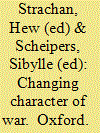

|
|
|
|
|
| Publication |
Oxford, Oxford University Press, 2011.
|
| Description |
x, 564p.
|
| Standard Number |
9780199596737
|
|
|
|
|
|
|
|
|
|
|
|
Copies: C:1/I:0,R:0,Q:0
Circulation
| Accession# | Call# | Current Location | Status | Policy | Location |
| 056384 | 355.02/STR 056384 | Main | On Shelf | General | |
|
|
|
|
| 3 |
ID:
086163


|
|
|
|
|
| Publication |
2009.
|
| Summary/Abstract |
President-elect Barack Obama's announcement that closing the US detention facility at Guantanamo Bay, Cuba, would be among his priorities has raised hopes among Europeans. Reform of the detention system may be perceived as a first step towards the renewal of closer transatlantic ties, in line with the wider expectations of European governments and domestic publics towards the new US administration. Apart from the symbolic value, reform of US detention policy would also have the practical benefit of facilitating transatlantic cooperation in areas where it is most crucial: intelligence-sharing, transnational law enforcement and the conduct of multinational military operations.
European governments will also need to rethink their own approach to detention. Their reaction to US detention policies has encompassed both critical rhetoric and tacit acceptance (and sometimes assistance). These European governments have, however, not done enough to face up to the problem themselves.
|
|
|
|
|
|
|
|
|
|
|
|
|
|
|
|
| 4 |
ID:
090183
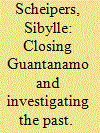

|
|
|
|
|
| Publication |
20009.
|
| Summary/Abstract |
Closing Guantanamo confronts the United States and the West more generally with two different but interrelated tasks. The first is facing up to the past detention policy: how could it happen that the prohibition against torture, which both academics and policymakers regarded as a strong and consolidated norm in international relations, yielded under the weight of the shock and fear caused by the events of 11 September 2001.
|
|
|
|
|
|
|
|
|
|
|
|
|
|
|
|
| 5 |
ID:
134168
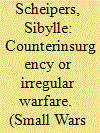

|
|
|
|
|
| Publication |
2014.
|
| Summary/Abstract |
This article argues that the history of irregular warfare provides a valuable analytical and critical perspective for the study of counterinsurgency campaigns and counterinsurgency doctrine. A focus on the history of irregular warfare highlights the close relationship between warfare in Europe and in the colonies. Moreover, it enables us to identify more exactly the intersection of multiple factors that lead to an escalation of violence in small wars. Finally, it also sheds light on the lack of strategic reflection on the use of irregular auxiliaries that is characteristic for many counterinsurgency campaigns.
|
|
|
|
|
|
|
|
|
|
|
|
|
|
|
|
| 6 |
ID:
114604
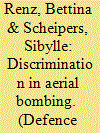

|
|
|
|
|
| Publication |
2012.
|
| Summary/Abstract |
This article questions the notion that the norm of discrimination in air
warfare has become increasingly relevant among Western publics, policy-makers and the military in the course of the 20th century. The article offers a critique of the existing literature, which tends to
overemphasise the contrast between the largely indiscriminate use of air
power in World War II on the one hand and the greater restraint in air
strikes in armed con?icts in the second half of the 20th century on the
other. This critique will be underpinned by six short case studies discussing the uses of air power in limited con?icts from the 1920s to-today. The ?ndings indicate that the norm of discrimination had a great
salience in small wars ever since the emergence of air power
|
|
|
|
|
|
|
|
|
|
|
|
|
|
|
|
| 7 |
ID:
128773
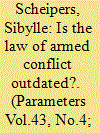

|
|
|
|
|
| Publication |
2013-14.
|
| Summary/Abstract |
The law of armed conflict has often been described as outdated and ill suited to military conflict in the twenty-first century. Both academics and practitioners have argued that today`s wars tend to be asymmetric conflict between states and nonstate actors, whereas the law of armed conflict was made with a view to symmetrical interstates war. This article challenges that notion.
|
|
|
|
|
|
|
|
|
|
|
|
|
|
|
|
| 8 |
ID:
151570
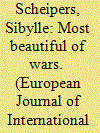

|
|
|
|
|
| Summary/Abstract |
Carl von Clausewitz was both an avid analyst of small wars and people’s war and, during the wars of liberation, a practitioner of small war. While Clausewitz scholars have increasingly recognised the centrality of small wars for Clausewitz’s thought, the sources and inspirations of his writings on small wars have remained understudied. This article contextualises Clausewitz’s thought on small wars and people’s war in the tradition of German philosophical and aesthetic discourses around 1800. It shows how Clausewitz developed core concepts such as the integration of passion and reason and the idea of war in its ‘absolute perfection’ as a regulative ideal in the framework of his works on small wars and people’s war. Contextualising Clausewitz inevitably distances him from the twenty-first-century strategic context, but, as this article shows, it can help us to ask pertinent questions about the configuration of society, the armed forces and the government in today’s Western states.
|
|
|
|
|
|
|
|
|
|
|
|
|
|
|
|
| 9 |
ID:
134680
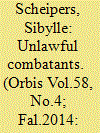

|
|
|
|
|
| Summary/Abstract |
The West's treatment of irregular fighters in the “war on terror” was highly problematic. This article contends that we must look beyond the assumption that political and strategic considerations compromised the law and led to the “invention” of the category of the “unlawful combatant.” Rather, the law of armed conflict itself includes strong exclusionary mechanisms towards irregular fighters. These exclusionary strands in the law came to dominate the West's strategic decision-making on the treatment of irregular fighters. Moreover, the fact that irregular fighters became such a vital issue post-9/11 was not a result of the war on terror being a new kind of war, as has often been argued. Rather, this article suggests that it reflects an identity crisis of the West's regular armed forces at the start of the twenty-first century.
|
|
|
|
|
|
|
|
|
|
|
|
|
|
|
|